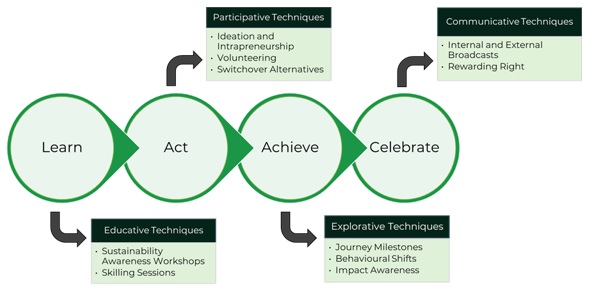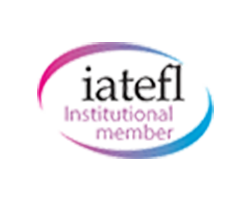Empowering Teacher Upskilling: A Partnership For Educational Excellence With ACT
21st August 2023

The realm of education is in a state of rapid evolution, undergoing transformative changes in recent years. At the forefront of this transformation lies the National Education Policy 2020 (NEP 2020), a visionary document crafted by the Ministry of Human Resource Development (MHRD) that envisions the trajectory of education in the nation. Among the various facets addressed within NEP 2020, a pivotal concern pertains to teacher education, a matter expounded in Section 15.
The upskilling of teachers is a necessity faced by the radical changes in the teaching sector. While India enjoys massive geographic and cultural diversity, it also suffers from the socio-economic divide. There is still a huge gap in the Indian education sector that has been aggravated by the uneven distribution and shortage of professionally trained teachers. This is why the NEP has estimated to spend 6% of the GDP as opposed to the current 3.1% spending.
Here Is Why Upskilling Of Teachers Is Important
The NEP 2020 envisages the CPD for teachers as a method to stay academically updated, identify skills, map students' performance and provide a holistic student learning environment.

Source: atquest.in
Here is why teachers should be upgraded:
- Investing In Teacher Training To Achieve Targets
Investing in the professional development of teachers is an imperative strategy to realize the goals set forth by Sustainable Development Goal 4 (SDG4) which strives to ensure equitable and inclusive education along with lifelong learning opportunities. Across diverse regions, teachers stand as catalysts for improved student achievements and the overall advancement of educational excellence.
- Teacher Training And Its Transformative Influence On Equipping Students
In the contemporary educational paradigm, student-centric learning has eclipsed traditional methods and curricula. The dynamic shift in the employment landscape necessitates corresponding adaptations in the skillsets expected of graduates. This metamorphosis carries profound implications for the competencies that educators must acquire to effectively impart relevant skills to their students.
- Standardized Training and Guidelines
The absence of a unified training framework has impeded the preparation of educators. A national-level guiding set of National Professional Standards for Teachers (NPST), as envisaged in the National Education Policy (NEP), is a promising stride towards unifying expectations and competencies for educators at different career stages.
- Short-Term Upskilling Initiatives
The rapid evolution of technology mandates educators to adapt their pedagogical strategies. To resonate with Generation Z's reliance on digital platforms and social media, educators must continually update their teaching methodologies. Short-term upskilling courses not only ensure relevance but also enhance their capacity to cater to psychological aspects of student learning, particularly in virtual classrooms.
- Performance Evaluation
Traditional assessment methods may not align with the demands of virtual education and innovative teaching practices. Institutes must craft relevant assessment tools to gauge educators' practical skills, knowledge, and efficacy. Frequent assessments drive innovation and proficiency, ultimately uplifting learning outcomes.
Convocation Ceremony 2023
Hey, do you follow us on Social Media? We regularly share upgraded educational content, tips, feedback and more. Check us out by clicking the profiles here - Facebook / Twitter / LinkedIn / Pinterest / Instagram / YouTube
How the Asian College Of Teachers Can Help
Here are some ways ACT can help teachers upgrade themselves in a better way:
- Effective Communication Mastery
The efficacy of education lies in communication and interaction. By cultivating assertive communication skills, educators lay the foundation for comprehensive learning experiences. Effective communication is not only pivotal for transmitting knowledge but also for aiding students in grappling with assignments and comprehending the intricacies of digital tools.
- Infusing Creativity Into Pedagogy
Creativity is the catalyst that propels both teachers and students toward their zenith. ACT has a program that amalgamates creativity and intuition to engender an environment conducive to experimentation and exploration. This innovative approach aligns with the contemporary shift from conventional paper-based methodologies to digital pedagogical paradigms facilitated by the Asian College of Teachers' Integrated School Platform.
- Socio-Emotional Learning In The Classroom
Aiming to enhance socio-emotional acumen among teachers, ACT courses equip educators with model lesson plans designed to integrate socio-emotional learning (SEL) into everyday classroom instruction. By imbibing SEL skills, teachers foster holistic development, transforming obstacles into learning opportunities.
- Cultivating Interpersonal Proficiency
Teachers' holistic growth extends beyond academic prowess. Soft skills, encompassing leadership attributes, effective communication, and critical thinking, are indispensable across industries. Enhancing these interpersonal competencies enriches personal development, elevates empathetic understanding, and augments communication finesse.
- Enhancing Cognitive Engagement
Diverse learning patterns necessitate diverse teaching approaches. ACT programs emphasize the efficacy of visual aids and graphic design in facilitating comprehension and visual thinking skills. Enabling teachers to harness the power of visuals and audio-visual aids enhances the teaching-learning experience.
Pioneering Educational Efficiency Through Integration
As educational institutions embrace the digital frontier, the incorporation of an Integrated School Platform augments efficiency and educational efficacy. While there is a need to rethink the overall strategy for education, teachers and policymakers must find time to focus on reskilling and upskilling of their staff and faculty. With the Asian College of Teachers' teacher training courses in Malaysia intricate administrative processes are streamlined into mechanisms with the provision of teacher upskilling.
Find the right course for you and try out the course. Contact us at 65-3163-1068 or Whatsapp us at +66-81-262-8832. You can also mail us at asiancollegeofteachers@gmail.com.
Written By : Sanjana





